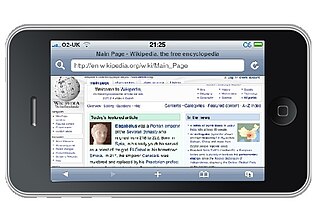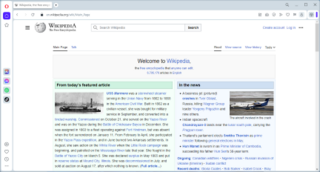
A browser game or flash game is a video game that is played via the internet using a web browser. They are mostly free-to-play and can be single-player or multiplayer.

Opera is a Norwegian multinational technology conglomerate holding company headquartered in Oslo, Norway with additional offices in Europe, China, and Africa. The company's total user base, including users of its desktop browsers, mobile browsers and other services exceeds 380 million monthly active users.

A mobile browser is a web browser designed for use on a mobile device such as a mobile phone or PDA. Mobile browsers are optimized to display Web content most effectively on small screens on portable devices. Mobile browser software must be small and efficient to accommodate the low memory capacity and low-bandwidth of wireless handheld devices. Traditional smaller feature phones use stripped-down mobile web browsers; however, most current smartphones have full-fledged browsers that can handle the latest web technologies, such as CSS 3, JavaScript, and Ajax.
A rich web application is a web application that has many of the characteristics of desktop application software. The concept is closely related to a single-page application, and may allow the user interactive features such as drag and drop, background menu, WYSIWYG editing, etc. The concept was first introduced in 2002 by Macromedia to describe Macromedia Flash MX product. Throughout the 2000-s, the term was generalized to describe web applications developed with other competing browser plugin technologies including Java applets, Microsoft Silverlight.

Minimo was a project to create a version of the Mozilla web browser for small devices like personal digital assistants and mobile phones.

The usage share of web browsers is the portion, often expressed as a percentage, of visitors to a group of web sites that use a particular web browser.

Internet Explorer Mobile is a mobile version of Internet Explorer developed by Microsoft, based on versions of the MSHTML (Trident) layout engine. IE Mobile comes loaded by default with Windows Phone and Windows CE. Later versions of Internet Explorer Mobile are based on the desktop version of Internet Explorer. Older versions however, called Pocket Internet Explorer, are not based on the same layout engine.

Opera Mini is a mobile web browser made by Opera. It was primarily designed for the Java ME platform, as a low-end sibling for Opera Mobile, but as of 2022 only the Android build was still under active development. It had previously been developed for iOS, Windows 10 Mobile, Windows Phone 8.1, BlackBerry, Symbian, and Bada.

The mobile web refers to mobile browser-based World Wide Web services accessed from handheld mobile devices, such as smartphones or feature phones, through a mobile or other wireless network.

Deepfish was an experimental browsing software system for Windows Mobile devices that used a zooming user interface, being developed at Microsoft Live Labs. It aimed to provide a consistent browsing experience on desktops and mobile devices, to display content on the small mobile displays in the same layout as larger displays, and to avoid the need to recode the web-page for small displays.
The usage share of operating systems is the percentage of computing devices that run each operating system (OS) at any particular time. All such figures are necessarily estimates because data about operating system share is difficult to obtain. There are few reliable primary sources and no agreed methodologies for its collection. Operating systems are used in the vast majority of computers, from embedded devices to supercomputers.

ThunderHawk is a discontinued web browser from Bitstream available for a full range of operating systems in high end and mass-market mobile phones and personal digital assistants. It is basically meant for mobile operators and original equipment manufacturers and not meant to download for normal users.

UC Browser is a web browser developed by mobile internet company UCWeb, a subsidiary of the Alibaba Group. It was the most popular mobile browser in India and Indonesia, and the second most popular one in China as of 2017. Its world-wide browser share as of May 2022 is 0.86% overall according to StatCounter.

Opera is a multi-platform web browser developed by its namesake company Opera. The browser is based on Chromium, but distinguishes itself from other Chromium-based browsers through its user interface and other features.
Iris Browser is a discontinued web browser for Windows Mobile smartphones and personal digital assistants (PDAs) developed by the Torch Mobile company. The first version was released in 2008. It was one of the first mobile browsers to score a perfect 100 on the Acid3 test.

The BOLT Browser was a web browsing system for mobile phones including feature phones and smartphones able to run Java ME applications. The BOLT browser was installed on the phone, and BOLT servers accessed Web pages, processed and compressed them, and delivered them to phones running the browser. The BOLT Browser was offered free of charge to consumers, and by license to mobile network operators and handset manufacturers. BOLT was produced by Bitstream Inc., the company which previously produced ThunderHawk for mobile network operators and handset manufacturers. BOLT was originally introduced into private beta on January 15, 2009 and was made available to the public on February 16, 2009 when the public beta was announced at Mobile World Congress in Barcelona. BOLT supported Java-based handsets with Java MIDP 2 and CLDC 1.0 or higher. BOLT also has specially optimized version for BlackBerry smartphones and worked with Windows Mobile and Palm OS devices that employ a MIDlet manager or Java emulator. BOLT was built using the WebKit rendering engine to display a full Web page layout as found on desktop web browsers.

Responsive web design (RWD) or responsive design is an approach to web design that aims to make web pages render well on a variety of devices and window or screen sizes from minimum to maximum display size to ensure usability and satisfaction.
Skyfire is a software company founded in 2007, and acquired by Opera Software ASA, now Otello Corporation, in 2013. In 2015, the company became the Network Solutions division of Opera, and ceased using the Skyfire brand name. They offer network optimization technologies including video optimization and monetization tools for carriers. Skyfire discontinued its Skyfire Web Browser in 2014 in order to consolidate its focus on its mobile operator technology. Skyfire was funded by venture capital, and was acquired by Opera Software ASA in March 2013.
Cake Browser was a swipe-based mobile web browser developed by Cake Technologies, Inc., a tech startup founded in 2016 in Provo, Utah. Cake Browser displayed search results as preloaded web pages instead of a list of clickable links. Results were swipeable across standard search verticals, including web search, image search, video search, news, and shopping. In 2017, Cake Browser launched in test markets within Australia, Canada, New Zealand, and Taiwan. It launched globally in 2018. Cake Technologies announced in 2018 that it had raised $5 million in funding for Cake Browser led by Peak Ventures with participation from Pelion Venture Partners and Kickstart Seed Fund.











